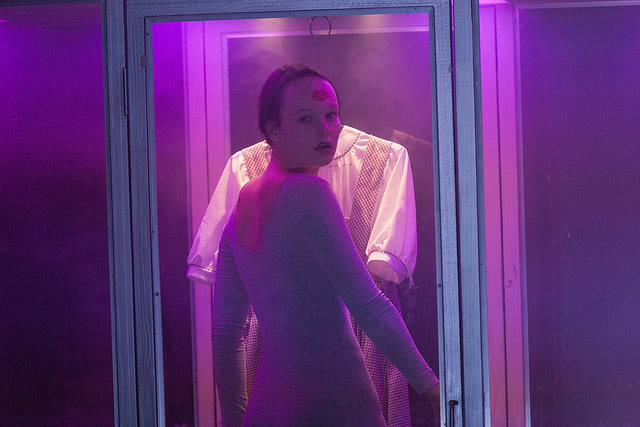We’re all aware of the folklore and mythology of The Wizard Of Oz – however, this production doesn’t exactly offer what it says on the tin. Director Adena Jacobs presents a dark and twisted world of grotesque characters, drenched in symbolism.
Dorothy enters a stark, concrete set from a Perspex box in the corner of the stage to find a dead witch. Stealing her ruby shoes, she then encounters the three main characters. Scarecrow (Melita Jurisic) is a woman tied by her wrists, crazed and losing her mind. Tin Man (Jane Montgomery Griffiths) gives a haunting monologue of heartbreak from a crackling speaker attached to her chest, while Lion (Paul Capsis) needs help finding her voice, before signing Judy Garland’s ‘I’m Always Chasing Rainbows’. From here, the narrative skews across broad stokes of conceptual ideas, with no real linearity or purpose.
The play has little to no dialogue; instead using movement, sound and lighting to tell its story. This reconstruction uses the original myth to explore femininity from a range of viewpoints, with Dorothy on her journey to womanhood. She discovers her friends as oppressed women, all victims of constructs needing to be set free. Oz is their oppressor, while the (only) Witch (Luisa Hastings Edge) is a sexual and ambitious woman rather than an evil hunter.
The production values are rather high here, with Ralph Myers’ dark and minimalist set, while sound and lighting design by Max Lyandvert and Emma Valente respectively draws the audience into a visceral and almost edge-of-seat experience. The performances by the whole cast are equally grotesque and graceful simultaneously, using movement to convey multiple meanings.
When all elements work together, it’s a heightened experience, but even at a short 70 minutes, some parts become extremely slow and clunky. I’m still not sure what I saw, and what it all meant, or even if it was good, but it’s a memorable and symbolic exploration into a classic that seems fit for the 21st century mindset.
3/5 stars
The Wizard Of Oz is playing at Belvoir St Theatre until Sunday May 31.

































